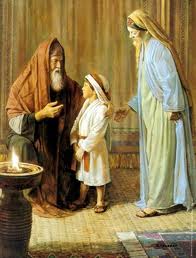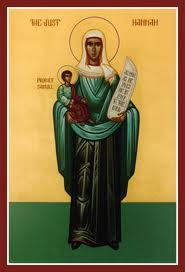I am going to take this opportunity to introduce you to a saint that I have developed a special devotion to, St. Hannah. St. Hannah is the patron saint of childless wives and infertile women (whether they have children or not), and I strongly identify with her suffering. When I was going through active infertility treatments I spent a lot of time prayerfully conversing with her about my frustrations, my sorrows, and my pain. Since today is St. Hannah’s Feast Day I wanted to take this opportunity to help our readers get to know this little known saint a little better. ![]()
I first “met” Hannah through the book (not Catholic) Hannah’s Hope: Seeking God’s Heart in the Midst of Infertility, Miscarriage & Loss by Jennifer Saake and then the Catholic Infertility blog Hannah’s Tears Ministry. I have since read her story in the Bible so many times I felt like I knew her – or know her.
Hannah’s story is told at the very beginning of the first book of Samuel. Elkanah had two wives: Hannah and Peninnah. Peninnah and Elkanah had children (sons & daughters), but Hannah remained childless. The reading says
“When the day came for Elkanah to offer sacrifice, he used to give a portion each to his wife Peninnah and to all her sons and daughters, but a double portion to Hannah because he loved her, though the Lord had made her barren. Her rival, to upset her, turned it in to a constant reproach to her that the Lord had left her barren.” (~ 1 Samuel 1:4 – 6, NAB)
I think it’s key here that the author of this book says “a double portion to Hannah because he loved her.” Elkanah wanted Hannah to be viewed as equal in the temple, he wanted her to feel special. He knew that Peninnah reproached Hannah for being barren and he wanted her to feel loved and honored. Some have even speculated that Hannah was the favored wife of Elkanah. The passage goes on to show us that Elkanah was greatly troubled by Hannah’s sorrow over her barrenness: “Her husband Elkanah used to ask her: ‘Hannah why do you weep and why do you refuse to eat? Why do you grieve? Am I not more to you than ten sons?” (1 Samuel 1:8)
If you’re infertile, or if you know someone who is, you know that this is not an uncommon conversation. My husband and I have had it more than once during our journey so I can really relate to Hannah. She feels broken, she’s wondering to herself “what’s wrong with me? Why does Peninnah get to be a mother? Look how mean and nasty she is to me!” and Elkanah is simply thinking “Hannah has everything she needs and I love her? Why isn’t that enough?”
The next part of the story makes me laugh every time I read it.
Hannah rises early in the temple and is seen by the priest Eli. While she’s praying Hannah begins to weep. She says “O Lord of hosts, if you look with pity on the misery of your handmaid, if you remember me and do not forget me, if you give your handmaid a male child I will give him to the Lord for as long as he lives neither wine nor liquor shall he drink and no razor shall ever touch his head.” (1 Samuel 1:11) and while Eli watches her pray he thinks that she’s drunk and says to her “How long will you make a drunken show of yourself? Sober up from your wine!” (1 Samuel 1:14) She’s so upset that he thinks that she’s drunk! While I’ve never been in prayer in a public place and become so upset that I’ve been mistaken for being drunk, I have had people look at me – and I can only imagine what they’ve been wondering.
Eli assures her that her request has been heard by the Lord and she goes on to give birth to a son, Samuel, whose name means “God heard.”
 As she leaves Samuel at the temple (at the age of 3, after he’s been weaned) with Eli she offers up a beautiful prayer that some have said is similar to the Magnificat that Mary sends to God when she arrives at Elizabeth’s house (another infertile woman in the Bible who also conceives a son after many years of barrenness).
As she leaves Samuel at the temple (at the age of 3, after he’s been weaned) with Eli she offers up a beautiful prayer that some have said is similar to the Magnificat that Mary sends to God when she arrives at Elizabeth’s house (another infertile woman in the Bible who also conceives a son after many years of barrenness).
Hannah’s prayer begins:
“My heart exults in the Lord, my horn is exalted in my God. I have swallowed up my enemies; I rejoice in my victory. There is no Holy One like the Lord; there is no Rock like our God.” (1 Samuel 2:1-2)
The Magnificat begins:
“My soul proclaims the greatness of the Lord; my spirit rejoices in God my savior. For he has looked upon his handmaid’s lowliness; behold, from now on will all ages call me blessed. The Mighty One has done great things for me, and holy is his name.” (Luke 1:46 – 49)
Hannah disappears from the book of Samuel after the author tells us that the Lord blessed Hannah with three more sons and two daughters.
The greatest comfort that I have found in the Communion of Saints is not only that these holy people now reside with God and can intercede on our behalf (let’s face it, I need all of the help I can get), but that they were real people with real problems and real humanity. Hannah deeply felt the pain of infertility. Elkanah deeply felt the pain of his wife. The Lord blessed them with six children – in God’s time. The saints are there for us to serve as our guide and to help us understand that pain is a normal part of life, that it’s normal to beg & plead with God when we don’t think He hears us, that it’s normal to be confused about our call in life. St. Hannah is in heaven now and there are days when I can almost hear her saying “I understand.”
I don’t think that there’s any coincidence that St. Hannah’s day falls during Advent – the season of waiting. Hannah teaches us that good things come to those who wait. Hannah teaches us that the Lord wants to see our pain, the Lord wants us to lay our emotion at his altar. Hannah reminds us that husbands who love their wives want them to feel whole and loved and valued.
St. Hannah pray for the childless women and those women who long for another child who read this post today, intercede for us that we may soon join you in prayers of thanksgiving and celebration.

